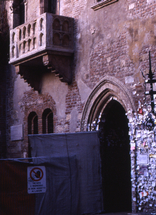Early Modern Circle 2010

Programme for 2010
19 February
Organized by Dr Andrea Rizzi, Italian Studies
The Evanescent Public Sphere: Ballads Singers in the Communications Culture of Renaissance Italy
5-7 pm Babel Building Chisholm Theatre (3rd floor)
A talk by Dr Massimo Rospocher (Trento) and Dr Rosa Salzberg (Queen Mary and UK Society of Renaissance Studies).
Massimo Rospocher is a postdoctoral researcher at the Istituto Italo-Germanico in Trento, working on a project titled "Communicating war in early modern Europe: from the public sphere to the private forum (XV-XVII cent.)". He completed his PhD at the European University Institute, Florence, under the supervision of Anthony Molho. His thesis, on the figure of Pope Julius II in European political communication at the time of the Italian wars, is forthcoming as a monograph from Il Mulino.
Rosa Salzberg is currently Ruth & Nicolai Rubinstein Postdoctoral Fellow for the UK Society of Renaissance Studies. She completed her PhD in 2009 at Queen Mary College, London, on the dissemination of cheap print in Renaissance Venice. She did her BA and MA at the University of Melbourne.
15 March
Discussion session led by Dr Peter Sherlock
Teaching the European Reformation in contemporary Melbourne
Teaching a tertiary course on the history of the Reformation presents a unique set of challenges in twenty-first century Australia. While European and North American cultures have tended to retain some familiarity with the philosophical, theological and historical context of Reformation, this is not the case in Australian higher education. How can traditional themes of Reformation history, such as the shape of Lutheran or Calvinist doctrine, be imparted to students with no or little knowledge of Christianity, let alone more recent themes pursued by social and cultural historians? Even in the context of a theological college, how can students be introduced to the strength of difference in theological convictions of European reformers on the one hand, and the cultural outworkings of those convictions in popular culture and high politics on the other? Peter Sherlock will lead the discussion by introducing the subject he is teaching at the United Faculty of Theology in 2010, and inviting participants to examine some of the concepts in MacCulloch's 2003 book with a view to how they might be understood in contemporary Australia.
Suggested reading:
Diarmaid MacCulloch, The Reformation (New York: Viking, 2003), pp. xvii-xxiii, 24-25.
19 April
Dr Dolly MacKinnon
'The bell, like a speedy messenger, runs from house to house, and ear to ear': The Auditory Markers of Gender, Politics and Identity in England, 1500-1700
17 May
Two shorter papers:
Charlotte-Rose Millar
Witchcraft, Catholicism and the Devil in Sixteenth-Century England
Helen Merritt
Legitimation and the Informers of the Popish Plot, 1678-1685
21 June
Dr Hugh Hudson
The Del Beccuto of Florence: More on the Maternal Family of the Renaissance Artist Paolo Uccello
The Del Beccuto family ancestry can be traced to twelfth-century Florence. Although they made significant contributions to the city’s government during the Middle Ages, it was in the early Renaissance that they produced their most singular contribution to its culture and international& renown, through the figure of one of their sons, the artist Paolo Uccello. This paper presents a wide-ranging discussion of the family, its social and political affiliations, its patronage and benefaction and the influence it had on Uccello’s career, art and identity.
16 August
Michael Pickering
Reality Bites: The role of Einbildungskraft in the construction of the vampire as sentient corpse in Michael Ranfft's 'Von dem Kauen und Schmatzen der Todten in Graebern'
20 September
Dr Jenny Spinks and Professor Charles Zika
Disasters in print in early modern Europe
25 October (note change of date for this meeting)
Claudia Guli
'I doe not knowe how a kinge can bee a delinquent': The basis of royal authority in the English political system
PhD completion seminar
The prevailing opinion among scholars is that the trial of Charles I was illegal. This view, however, fails to take into account the arguments that supporters of the King’s trial gave for the people’s right to try their king. These arguments, which can be found in contemporary pamphlets and tracts, were based on classical, medieval and sixteenth-century ideas of law, governance and justice. This paper will argue that these justifications for the trial show that whilst it may not have been supported by previously articulated English law, it was commensurate with historical precedent, divine and natural law and the fundamental laws of the realm.
15 November
Julie Davies
Vehicles and Vapours: Joseph Glanvill and Conceptions of Spirit in Seventeenth-century England